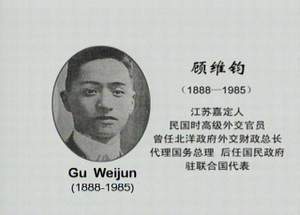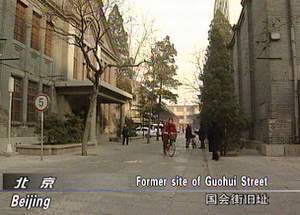 |
|
Dream of the Republic (3)
Winds in the Political Arena |
| CCTV.COM 2002-08-22 14:08:02 |
|
 In April of 1912, Gu Weijun, a student, returned to Beijing from the United States. It took 13 days for him to finish the trip. This young man came to be an English secretary at the Presidential Palace at the invitation of Yuan Shikai. Later in his memoirs he wrote down his first impressions on the city. It was sad to see that in Beijing most men still wore long braids, and lunar almanac and solar calendar were both printed in newspapers. China seemed to be in a period of transition from an old system to a new era. In April of 1912, Gu Weijun, a student, returned to Beijing from the United States. It took 13 days for him to finish the trip. This young man came to be an English secretary at the Presidential Palace at the invitation of Yuan Shikai. Later in his memoirs he wrote down his first impressions on the city. It was sad to see that in Beijing most men still wore long braids, and lunar almanac and solar calendar were both printed in newspapers. China seemed to be in a period of transition from an old system to a new era.
Sun Yat-sen left the Presidential Palace in Nanjing after handing over his power to Yuan Shikai, new Provisional President. Prior to it, the Provisional Senate had been in a rush to formulate a provisional constitution and tried to limit Yuan's power through parliament and cabinet. Obviously members of the revolutionary party were vigilant about this former Prime Minister of the Qing Empire.
The country's political center was moved from Nanjing to Beijing. Beijing had been the Empire's Capital two months ago. People became citizens of the republic. Before they were subjects of an emperor. A new phrase often appeared in newspapers. That was Political Party.
Many parties existed in the political arena. 30-year-old Song Jiaoren, Cabinet Minister for Agriculture and Forestry, was talented in leadership. In the spring of that year, he came to Beijing with other members of the first cabinet. He wanted to fulfil his political aspiration by drawing an ambitious plan for the future of the republic.
 Guohui Street became political center in Beijing where Provisional Senate had existed. Song Jiaoren and other cabinet members often came to report their work to senators who represented the interests of the people, and sought advice. Everything seemed to go well in the republic. Several months later, President Yuan Shikai's ambition of arrogating all power to himself through controlling the cabinet was gradually exposed. Song Jiaoren was so disappointed that he resigned his office. Guohui Street became political center in Beijing where Provisional Senate had existed. Song Jiaoren and other cabinet members often came to report their work to senators who represented the interests of the people, and sought advice. Everything seemed to go well in the republic. Several months later, President Yuan Shikai's ambition of arrogating all power to himself through controlling the cabinet was gradually exposed. Song Jiaoren was so disappointed that he resigned his office.
On August 25, 1912, under Song Jiaoren's presidency, the Chinese Revolutionary League united itself with four major political parties and formed the Nationalist Party--Kuomintang. They tried to limit Yuan Shikai's power through cabinet. At a meeting of its foundation, Kuomintang issued a proclamation and the party's aim: Consolidate the republic and carry out a policy for common people. After the meeting, Song Jiaoren ran in the parliament election whole-heartedly.
The national anthem of the Republic of China at that time was arranged by Wang Rongbao, a congressman, from "Song of Blue Clouds" that was composed by Xiao Youmei, a member of the Chinese Revolutionary League. The music showed people's concern about the republic's future at that time.
 A parliament election began in January of 1913 all over the country. It was a democratic election, the first of its kind in China, which lasted for over a year. Different parties and organizations tried to participate in managing the state through the election. As a result, Kuomintang led by Song Jiaoren won the election by an overwhelming majority and thus became a major party in parliament. On April 8, 1913, the first parliament meeting opened at 11:00 am amid the melody of "Song of Blue Clouds". But the national anthem had been played only once because the parliament existed for a short period of nine months. A parliament election began in January of 1913 all over the country. It was a democratic election, the first of its kind in China, which lasted for over a year. Different parties and organizations tried to participate in managing the state through the election. As a result, Kuomintang led by Song Jiaoren won the election by an overwhelming majority and thus became a major party in parliament. On April 8, 1913, the first parliament meeting opened at 11:00 am amid the melody of "Song of Blue Clouds". But the national anthem had been played only once because the parliament existed for a short period of nine months.
|
|
|
|
|
|
|
 |









